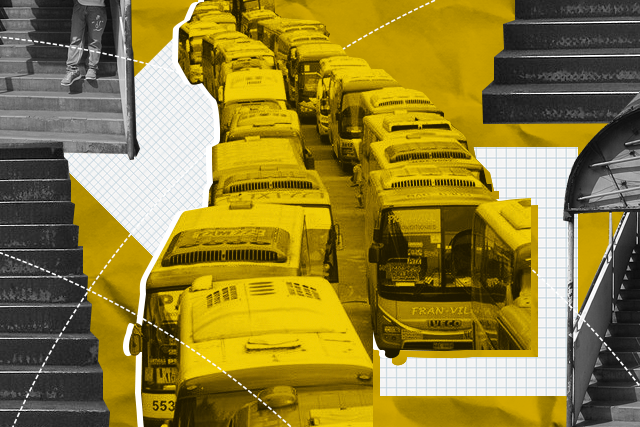An art director, who is also a regular commuter, proposed some suggestions to ease traffic along EDSA following the recent implementation of the Metro Manila Development Authority’s new bus policy.
Caleb Cosico through a Facebook page shared a series of infographics the day the government agency strictly enforced the “yellow lane policy,” which restricts EDSA’s two outermost lanes to city buses.
The policy, rather than ease congestion in the main thoroughfare, only caused an extreme build-up of vehicular traffic based on viral social media posts of commuters.
Cosico in his post shared a few suggestions that he believed would decrease the congestion along EDSA but added it was only formed from the perspective of a regular EDSA commuter.
“I travel EDSA regularly. And I’ve tried every possible route, hack, cheat to beat EDSA traffic. I wait in line at the MRT (Metro Rail Transit) or sit in the bus dreaming of ways to make EDSA traffic more bearable. So here’s a suggestion,” he wrote.
“This is just a suggestion. I’ve thought about this a lot but I’m neither an urban planner nor a city engineer. So the nitty-gritty details escape me,” Cosico added.
Under Cosico’s proposal, the three innermost lanes of EDSA would be exclusive for buses, particularly point-to-point buses, city buses and provincial buses.
“The intent is for PUVs (public utility vehicles) to have exclusive use of the underpasses and flyover. That’ll ensure that they move faster,” he wrote.
The two lanes beside the exclusive bus lanes would then be allotted for private vehicles while the outermost lane would be exclusive for motorcycles.
Buses would also follow a certain schedule to ensure that there wouldn’t be “too many of them on the road.”
Cosico mentioned that bus stops are ideal to be placed in MRT stations, where it would have overpasses that can connect to the streets.
“This will also eliminate the tendency of people waiting on the streets, and the habit of (buses) stopping to drop off and pick up passengers anywhere. Dahil walang dadaanan, kailangan mo sa Bus Stop sumakay,” he said.
Cosico said that private vehicles should be on the outer lanes of the thoroughfare since they are the ones “that really need to turn into and off EDSA” while motorcycles would be on the outermost lane to “prevent them from weaving in and out of traffic.”
His proposal came the day MMDA strictly enforced the “yellow lane policy.”
MMDA’s bus policy
The government agency on August 7 strictly implemented the “yellow lane policy” where two outermost lanes of EDSA would be restricted to city buses in a bid to discipline swerving bus drivers.
It came after MMDA recently observed that public utility vehicles were not thoroughly following the policy.
According to MMDA traffic chief Edison Bong Nebrija, buses were going out of their designated lanes “to get ahead of other buses.”
It resulted in the strict implementation of the policy which eventually worsened traffic conditions, according to the experience of some commuters.
Videos and pictures of EDSA during the implementation went viral on social media as it featured the “yellow lanes” being heavily congested while the lanes allotted for private vehicles were smooth-flowing.
The policy caused some commuters to call MMDA “anti-poor.”
Apparently, enforcers had ordered the provincial buses to ply the “yellow lane” as well, even though they are allowed to use the third lane.
They were also not allowed to ply flyovers and tunnels.
MMDA spokesperson Celine Pialogo added that city buses had taken over the intersections situated along the main thoroughfare which increased the congestion.
There were also private vehicles who failed to switch lanes and got stuck in the bus lanes instead.
Many provincial buses ignored MMDA’s dry run of the EDSA ban as well, leading to an increase in vehicular traffic. — Artwork by Uela Altar-Badayos

